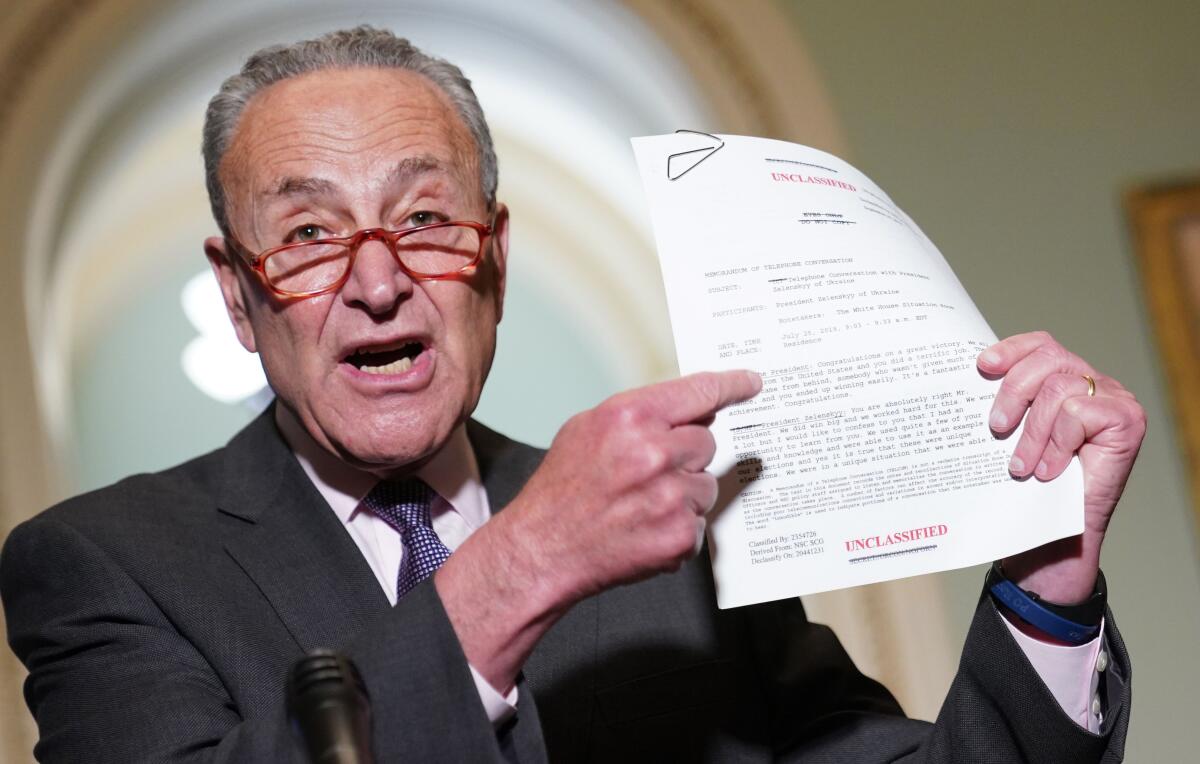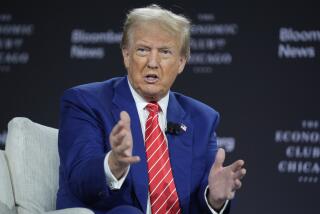Column: Trump told Ukraine he wanted a favor. Do we need more to impeach?

When the White House released a rough transcript of President Trump’s July phone call with Ukrainian President Volodymyr Zelensky, the display of fake transparency brought to mind another bit of administration showmanship: the goony maneuver performed by Atty. Gen. William Barr on March 24, as he big-footed the report by special counsel Robert S. Mueller III.
Barr laughably declared that the special counsel’s findings showed “no collusion” between Trump and the Kremlin. Of course, as Rep. Adam B. Schiff (D-Burbank) later showed, the report actually chronicled a rampage of small-c collusion, not to mention obstruction of justice, even as the special counsel declined to indict Trump on formal charges of criminal conspiracy.
This time around, as the House gets a formal impeachment inquiry off the ground, Barr did not offer his own misleading summary of the Trump-Zelensky call. But the “memorandum” released by the White House contains certain fishy hallmarks reminiscent of the attorney general’s snow job in March.
Given how damning the notes are in themselves, no one will be fooled. In fact, if the memo release was supposed to allay the “urgent concern” expressed about the Ukraine call by Michael Atkinson, the intelligence community inspector general, the White House play is an outright failure.
Well before the memo was released, experts warned they’d be incomplete. Conversations between American presidents and other world leaders are generally not recorded; masters of the universe apparently need to speak freely — locker-room talk, the evil mwa-ha-ha of feudal lords, that kind of thing. Moreover, we were told, aides who make notes on calls usually do not include sensitive, controversial topics.
Sure enough, the call notes are studded with ellipses. For example, the memo records Trump as saying to Zelensky, in his usual, vague pressure jargon: “There’s a lot of talk about Biden’s son, that Biden stopped the prosecution.” And then: “Biden went around bragging that he stopped the prosecution, so if you can look into it…. It sounds horrible to me.”
If you can look into it, I’ll keep the aid coming? If you can look into it, I’ll give you Michael Cohen’s old job? If you can look into it, covfefe?
The call notes are also, no surprise, thick with what Cohen, Trump’s former fixer, calls Trump “code.” This is mob-like innuendo that communicates coercion without explicit imperatives. The quid is not directly named, and neither is the quo.
Cohen said Trump used the code when he suborned perjury from his underling. “He would look me in the eye and tell me, ‘There is no Russian business,’” Cohen testified before Congress. “In his way, he was telling me to lie.”
Another example might be what Trump said in February 2017 to then-FBI Director James B. Comey about national security advisor Michael Flynn: “I hope you can see your way clear to letting this go, to letting Flynn go.” Donald J. Trump, Jr. has claimed his father was just blue-skying, expressing hope.
Yeah, right. When your boss says, “I hope you can finish this project in an hour,” you know what he means.
After fulsomely congratulating Zelensky on his recent election victory — “It’s a fantastic achievement” — Trump, according to the notes, offers imperatives couched as innocuous observations. “The United States has been very, very good to Ukraine,” he says. Over and over.
All sentient humans get the message when a parent, a boss, a client, a friend starts emphasizing, repeatedly, how well they’ve treated you. “I’ve been very, very good to you. And I wouldn’t want to have to stop.”
Zelensky, for his part, falls for Trump’s kiss-the-ring bids. “I would also like to thank you for your great support in the area of defense....” (He’s referring to military aid.) Then Trump pounces: “I would like you to do us a favor, though...”
Though.
Trump suggests that Zelensky ought to look into his political rival, former Vice President Joe Biden, the ouster of a corrupt prosecutor and Biden’s son’s dealings with a Ukrainian oil and gas company.
Let’s get this straight. The most powerful political leader in the world, the president of the U.S., GDP $19.39 trillion, asks the brand-new president of Ukraine, GDP $112.2 billion, for a favor? At the same time that Ukraine is hat in hand, waiting for U.S. aid, and an invitation to the White House?
A little later, Trump casually slags off “a man named Robert Mueller,” while crowing about Rudolph W. Giuliani, the president’s pro bono carnival barker. He even sings a few bars of his version of “Piano Man” — mentioning Hillary Clinton’s emails — for heaven’s sake.
In trying to pass the notes off as a transcript and, what’s more, have them stand in for the inspector general’s report, which Barr has kept from Congress, the notes release is an effort at blocking further inquiry, but a feeble one. No one’s curiosity about Trump’s efforts to involve foreign powers in our elections appears satisfied.
The Senate Intelligence Committee plans to meet Thursday with Joseph Maguire, the acting director of national intelligence, which could deepen understanding of the Trump-Zelensky interactions and the whistleblower complaint about them.
Schiff says the House Intelligence Committee will soon speak directly to the whistleblower. That will almost certainly add moral seriousness to the problems presented by Trump’s call.
And now these House hearings will take place in the context of the formal impeachment inquiry that House Speaker Nancy Pelosi kicked off on Tuesday. If anyone thought releasing the July 25 call notes would stop impeachment in its tracks, they were mistaken. The train has already left the station.
Twitter: @page 88
More to Read
A cure for the common opinion
Get thought-provoking perspectives with our weekly newsletter.
You may occasionally receive promotional content from the Los Angeles Times.










